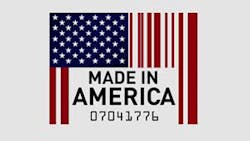Have an Idea? Let’s Manufacture It In the US
What does the National Institute of Standards and Technology (NIST) have in common with the Pep Boys and Bed Bath and Beyond?
They all want to see more products manufactured in the U.S. and are willing to join together to make that happen.
Under the umbrella of Edison Nation, whose tag line is “You Invent. We Produce (All in the U.S.),” these organizations are banding together to make it easier for small and medium-sized businesses to manufacture new products in the U.S.
“As we were looking for opportunities for U.S. manufacturers one of the things we noticed was many of the ideas from inventors around the country require manufacturing,” explained Dr. David Cranmer, senior researcher, NIST Manufacturing Extension Partnership. “Why shouldn’t that work go to a U.S. manufacturer?” Cranmer asked.
Rather than having an inventor struggle through the process of building a company to manufacture their new product, why not take the idea, flesh it out and then offer to established manufacturers, Cranmer suggests.
In 2011 NIST, a federal government arm that supports small business, partnered with Edison Nation. The result was Made In America searches, a live product searches series that works much like a typical search – but with a patriotic twist. For ideas selected by the participating search sponsors, NIST will find a U.S.-based manufacturer through their Manufacturing Extension Partnership, who will have the first chance to bid for this development work.
Edison Nation is responsible for establishing and cultivating relationships with top retail and manufacturing partners in order to secure licensing deals for inventors.
Inventors can also get assistance with manufacturing design through an affiliate of Edison Nation.
In December of 2012 until February of this year RTI International, which is based in Research Triangle Park, N.C. released a call for ideas, and invited Edison Nation’s inventor community, as well as U.S. small and medium manufacturers through the NIST MEP program.
Some of the products that are being developed include; power tool innovations, games, toys, outdoor lifestyle products and kitchen products that meet the needs of the aging consumer. All of these ideas were requested from specific sponsor companies such as Worx, Corelle, Pyrex and others.
“Last month we posted the request for quotes to U.S. small and medium manufacturers through the NIST MEP system to offer them the opportunity to bid on making these products. This is why we call the program ‘Made in America’ since normally at this point in the process overseas manufacturers are sought to manufacture these goods,” said Kirsten Rieth, innovation advisor for RTI International.
Over 2,000 ideas came in during that period. From May until June the group will receive quotes from manufacturers and the company search sponsors will review and select manufacturers to build these products.
Creating breakthrough technology is a driving force for Scott G. Dromms, manager, Intellectual Property for Edison Nation.
“We have a factory that became engaged in Made in America search for this round that submitted a proprietary material that we have tested," said Dromms. "We believe it will become a very important technology. How wonderful to know that this type of working is being done in the U.S. and now we can manufacture it here as well.”
Edison Nation has already found success in a number of products that have sold over one million units including:
Pressix Technology -- A system for keeping trash can liners in their proper place, without having to tie, knot or tear a single bag. It is available on high-end trash cans which are sold at Williams Sonoma, The Container Store and Walmart.
Eggies -- This is a heat-resistant, egg-shaped container that prevented hairline fractures and is sold at Bed, Bath & Beyond as well as Walgreens.
Gyro Bowl -- This snack bowl swivels, dips and oscillates to withstand the quick movements of a toddler. It is sold through infomercials.
Promoting U.S.-based manufacturing has become easier as of late due to the popularity of the reshoring movement.
“The thinking used to be that it’s cheaper to produce products overseas,” Dave said. “In fact the venture capital community said that you had to produce the product in China. That has changed as manufacturers review all of the costs involved.”
